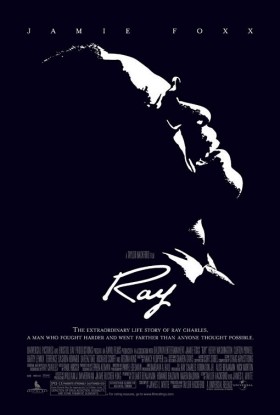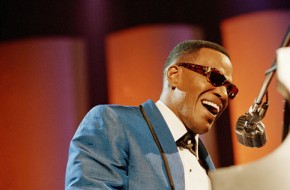|
Ray
Late in Ray, Ray Charles suffers an
hallucination in which he can see. At that moment, he takes
off his sunglasses and reveals himself to actually be actor
Jamie Foxx. It's a startling and almost spell-breaking shot,
because you can absolutely believe the hype. Foxx so effectively
submerges himself in the life and character of the troubled
singer that you forget that he is, after all, just an actor
playing the man.
The performance moves beyond mere impersonation.
Every tic, every trait, just seems natural. Prosthetics
help a bit, forcing Foxx's eyes shut, but the heart and
soul come from within. So it's really a shame that the script
falls prey to so many false moments; Foxx himself never
has one.
Written by James L. White and director
Taylor Hackford, the story covers Charles' rise from young
honky tonk pianist to groundbreaking entertainer almost
consumed by his addiction to heroin. That in itself cannot
be considered trite, because, after all, it is true.
But the man's demons get literal manifestation
in the memory of his drowned brother, a disturbing image
that repeats too often and somehow gives a hollow excuse
to why Brother Ray got a taste for smack. To Hackford's
credit, the film at least reveals the drowning early, but
also recognizes it as a weak point.
Weaker, still, is the overall lack of impact
of heroin use until the film's climax. Though Atlantic Records
chief Ahmet Ertegun (a welcome Curtis Armstrong) recognizes
the addiction, it never gets in the way of recording. Charles
just has "the junkie itch." In a few spots, Hackford elides
some swipes at how the entertainment industry turns a blind
eye to drug use, but it's so subtle a lot of audiences may
miss that anything was wrong at all.
Charles
overcame many prejudices and predators, and the film does
include all that. But the script also makes some moments way
too pat, especially in portraying the development of his musical
style. You can buy that maybe, just maybe, the song "I've
Got a Woman" found inspiration in his falling in love with
his eventual wife, Della Bea (Kerry Washington). However,
the scene in which he discovers "Hit the Road, Jack" is almost
a parody of a movie moment - especially since the final credits
reveal somebody else wrote it.
Still, Hackford has a master director's
touch. The visuals soar even when the script bumps the road.
Despite its weaknesses, the film moves at a brisk clip that
makes its nearly three hours seem much less.
Part of
the credit has to go to Foxx, but the rest of the roles have
been cannily cast as well. Bokeem Woodbine quietly pulls focus
as the saxophonist "Fathead," a stalwart sideman for Brother
Ray for years. As Della Bea, Washington is nothing less than
luminous, a fine contrast to Regina King as Charles' first
Raelette and second major mistress, Margie Hendricks. (Even
there the script fails; the issue of his infidelity rears
its head then disappears. The guy had a bastard son and Della
Bea just shrugs. No man is that charming.)
The smaller roles, too, have been cast
for quirks. In addition to Armstrong getting the rare chance
to play something close to normal, Warwick Davis shows up
as an emcee at the first jazz club Charles plays for. It
could be an historically accurate casting, but it's good
to see the guy sans fur or leprechaun suit, actually
acting.
It is that acting that makes this film
absolutely worthwhile. Sure, the music's good, too, with
Ray Charles himself having re-recorded several vocals before
his death this year. But we've had his albums for years.
Now we have Foxx's performance, the latest in a string of
good roles for him, but the one that will finally make him
a star. Collateral made me think he was; Ray
puts him in his place.
Rating: 
|








